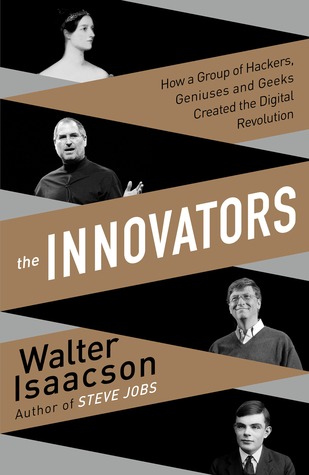Title: The Innovators: How a Group of Hackers, Geniuses, and Geeks Created the Digital Revolution
Author: Walter Isaacson
Enjoyment Rating: ***
Source: Kindle
I'll come clean with my biases first. I'm not a huge fan of biographies. I'd rather read ten memoirs than one biography. One of the most notable exceptions to this rule of thumb was Walter Isaacson's fantastic biography of Steve Jobs, and I decided to read The Innovators on the strength of that book (I have tried, and failed to read his Ben Franklin bio, and I think I own a copy of his Einstein bio too). The Innovators isn't exactly a biography-- instead it's more of a history of the digital revolution, which boils down to a whole bunch (maybe 50 or so) mini bios of individuals who have played significant roles in the revolution, from Ada Lovelace (the daughter of Lord Byron, who created the first algorithm carried out by a machine) down to Sergey Brin (Google) and Larry Sanger (Wikipedia). Isaacson posits the theory that the most successful innovators were people who were well-rounded-- interested in both artistic and scientific pursuits, and who had a supportive community with whom they could work. In fact, Lovelace had Babbage, Brin had Page, and Sanger had Wales (just as Jobs had Wozniak and Gates had Allen).
Honestly, I found the first half of the book to be deathly boring. The chapter on Ada Lovelace was pretty captivating, but from then on it was dullsville, jumping from professor to professor and their petty battles over vacuum tubes. The story got really interesting at the end of WWII, when a bunch of female programmers, including Jean Jennings and Grace Hopper, were hired to work on an early computer. They developed a language (COBOL) which enabled them to write commands for their computers using language rather than numbers. These women are generally credited with shifting the innovating focus from hardware to software development. The rest of the book was much more interesting, especially as Isaacson focused on characters who continue to play a huge role in our lives (where would we be without Google and Wikipedia? I've used them both half a dozen times while writing this review). So a worthwhile story, but it definitely had a slow start. I've read some critics who feel that Isaacson cherry picked innovators who fit into his "artist+scientist" thesis, but I don't know enough about the history of computer science to verify that.
As for me, while I'm glad I read the book, I still think reading memoirs by some of the main players would have been far more interesting.

No comments:
Post a Comment